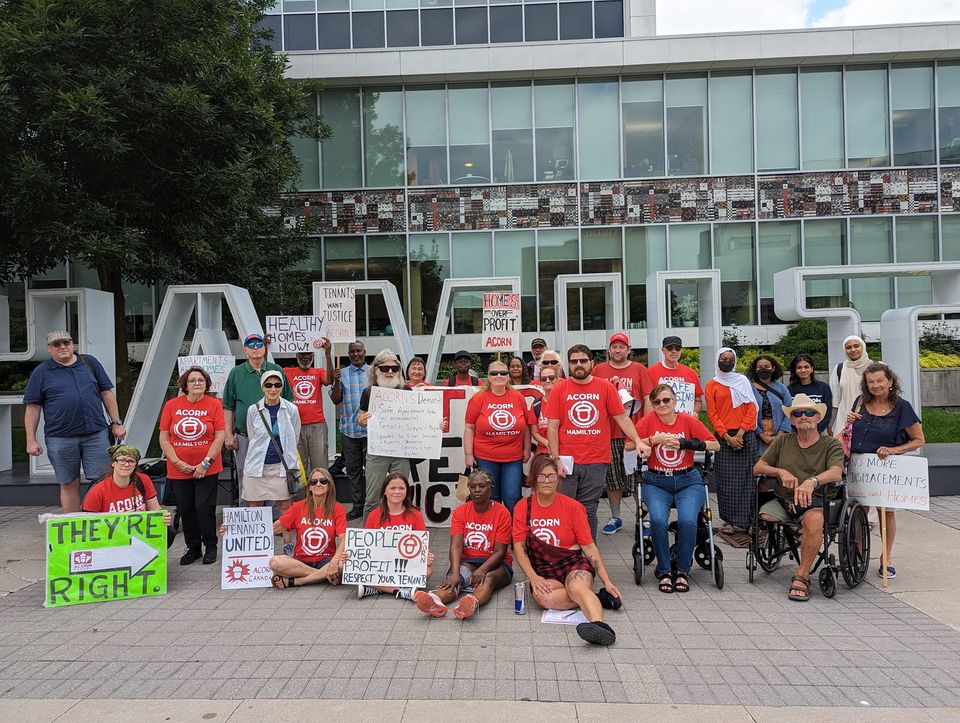Op-ed by Hamilton ACORN: Hamilton could pass first of its kind renoviction bylaw
Posted October 17, 2023
On Thursday, city councillors on the Emergency and Community Services Committee will be making a decision on the staff recommended renovations licence and relocation listings bylaw that was deferred from the meeting held in August.
Since 2019, ACORN has been fighting for local policy to protect tenants from renoviction. Renoviction is the practice and tactic used by landlords to evict or force out tenants under the guise of major renovation. The goal is to displace low- and moderate-income tenants who are paying below market rent. Ontario does not have vacancy control, which means landlords can increase the rent by any amount between tenancies. Therefore, once the units are vacated and renovated, they are re-rented at a much higher rate.
Across Hamilton, tenants have been displaced or are currently fighting to defend their homes from predatory and greedy landlords abusing the provincial loophole. While tenants do have the right of first refusal (legal right to return to the unit post-renovations at the same rent), ACORN has yet to see a landlord follow the law.
If Hamilton passes a renoviction bylaw, it would be the first of its kind in the province. And the policy is desperately needed. Protecting Hamilton’s affordable housing is more important now than ever. The average market rent in Hamilton for a one-bedroom apartment is currently $1,755, compared to $875 just seven years ago. The number of N13 (renoviction) applications filed at the Landlord and Tenant Board (LTB) in Hamilton has grown exponentially over the past few years — six were filed in 2012 and over 100 last year. This is a gross underestimate given that most predatory landlords force tenants to take buyouts and secure a “voluntary” termination of tenancy, thereby not pursuing the legal course of applying at the LTB. Hamilton has lost 15,000 units that rent for less than $750 a month in the last decade. That is 29 affordable units lost for every new affordable unit added.
The rise in renovictions has and will continue to have a devastating impact on Hamilton, at both the individual and systemic level. Renoviction shatters the lives of families, breaks long-held community bonds, drives up rents in the neighbourhood, increases homelessness and strain on social services, incentivizes landlords to allow their buildings to fall into disrepair and destroys existing stock of affordable housing.
Hamilton has an opportunity on Oct. 19 (Emergency and Community Services Committee, followed by council on Oct. 25 where any decisions will need to be ratified) to be a leader in Ontario in instituting local tenant protections.
ACORN commends the city’s effort to create a made-in Hamilton anti-renoviction bylaw; however, the proposed bylaw will not do enough to disincentivize renoviction or ensure tenants have the best chance of maintaining their housing. The bylaw needs to be improved to better ensure tenants understand their rights, are able to obtain temporary housing, and are able to successfully exercise their right of first refusal. We will be sharing our proposed amendments with city councillors and staff via a written submission to the committee.
If you are a tenant or concerned citizen in Hamilton, please consider signing our online petition urging your local elected representative to support a strong anti-renoviction bylaw.
Currently, ACORN is organizing and supporting tenants at 10 multi-residential buildings in the city facing renovictions. Tenants that call these buildings home are seniors on fixed incomes, tenants with disabilities, single parents and low-wage workers.
Tenants are counting on bold action from city hall. If the province is going to turn its back on low- and moderate-income tenant communities and prioritize landlord and investor profit, we need our local government to take a stand and protect the most vulnerable in our city.
ACORN (Association of Community Organizations for Reform Now) Canada is a multi-issue, membership-based community union of low- and moderate-income people.
***
Op-ed published by the Hamilton Spectator

